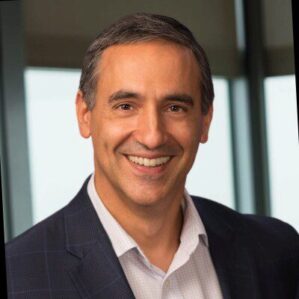 Upon graduating from the Penn M&T Program in 1993, with dual degrees from Wharton and Penn Engineering and also an MBA from Wharton, Ryan Limaye went straight to Goldman Sachs to begin a career as a technology investment banker. The rest, as they say, is history. 32 years later, he has spent his entire career doing what he loves, and he is still with Goldman, serving as its Head of the Global Technology Investment Banking group.
Upon graduating from the Penn M&T Program in 1993, with dual degrees from Wharton and Penn Engineering and also an MBA from Wharton, Ryan Limaye went straight to Goldman Sachs to begin a career as a technology investment banker. The rest, as they say, is history. 32 years later, he has spent his entire career doing what he loves, and he is still with Goldman, serving as its Head of the Global Technology Investment Banking group.
“What I love as an investment banker is that I sit in the middle of transactions that are helping to shape and redefine industries, whether it’s helping a growth company or helping larger companies acquire new technology or consolidate to drive performance,” he says. “Everything we work on has meaningful impact on the technology industry or one of its subsectors. Technology is always changing, and industries are always evolving because of technology innovation. As a tech banker, I am constantly seeing these changes and helping companies adapt and grow through this dynamism.”
As a high school student, Mr. Limaye was interested in business. During his junior year, via mentors, advisors and his parents, he learned there was value in obtaining a degree in engineering as well. At the time, Penn’s prestigious M&T Program was the only program in the country that offered a dual degree in business and engineering, and he explains that the ability to combine both degrees together felt like an attractive and differentiated course of study.
“At the time, I had no plans to be in tech or pursue a career in engineering – I was very focused on business. The ability to have that additional skillset, however, felt quite valuable,” he says.
Though he ended up in tech banking by “coincidence,” Mr. Limaye credits the M&T Program for preparing him well for the career path he took.
“As a banker – the Wharton side prepares you incredibly well for anything in finance or financial services by teaching the fundamentals of business and valuation,” he explains. “The Engineering side, however, adds an important analytical way of thinking. Though I don’t practice engineering or computer science, that methodical way of thinking is extremely helpful in banking because you must draw on all the things you have learned over your career and apply tools and frameworks to a particular problem or challenge like you do in Engineering.”
Though it seems counterintuitive, Mr. Limaye explains that he thinks engineers are very well-suited to investment banking, and specifically, technology banking. “Since I am a technology banker, I am working with Founders and CEOs who are mostly technologists and engineers, and my engineering degree gives me ‘street credibility’ with them from day one. For me, the engineering degree has been a differentiator,” he adds.
Looking at his industry overall, he believes AI is the most significant, disruptive technology shift we’ve ever seen. “It’s still early, and still needs to be proven out, but I think in the next few years it will be fascinating to see how our lives are transformed by AI,” he says. At Goldman, AI tools are being regularly rolled out to create efficiencies and modernize and streamline how bankers do their work. They are also working with clients to discuss how AI can transform their industries and help them work smarter.
Over the course of his career, Mr. Limaye has remained very involved with the M&T Program and regularly gives his time to mentor students and young alumni. To those who are considering a career in financial services or investment banking, he speaks from experience in terms of how well-prepared they will be when they complete the program. “You will have a phenomenal business skillset and will be trained as well as anyone who comes into banking. Combined with the engineering mindset, you will be extraordinarily well-prepared,” he says.
He advises that the one area where M&T students can do more is to take classes and electives on subjects they are interested in or passionate about outside of their major/concentration. He acknowledges that this can be very challenging due to the complex curriculum requirements M&T students face, but stresses that this can be a value add over the course of a career.
“Much of what you do in financial services goes beyond the financial work,” he says. “It’s about building relationships by talking to and engaging with clients. If you’re on a flight with a CEO for five hours, you may spend 30 minutes talking about the project you are working on and the rest of the time talking about something else. Whatever you’re passionate about, if you can deepen your knowledge in that area while you’re at Penn, it will give you more expertise and allow you to be more knowledgeable in those ‘non business’ conversations.”
He also stresses the importance of striking the balance between course requirements, clubs, activities, and so-called ‘resume-builders,’ and what you’re passionate about. “One more finance class isn’t going to make you a better investment banker over a 20-year career. Don’t try to do everything. Figure out what you’re passionate about and lean into that while at Penn,” he concludes.


